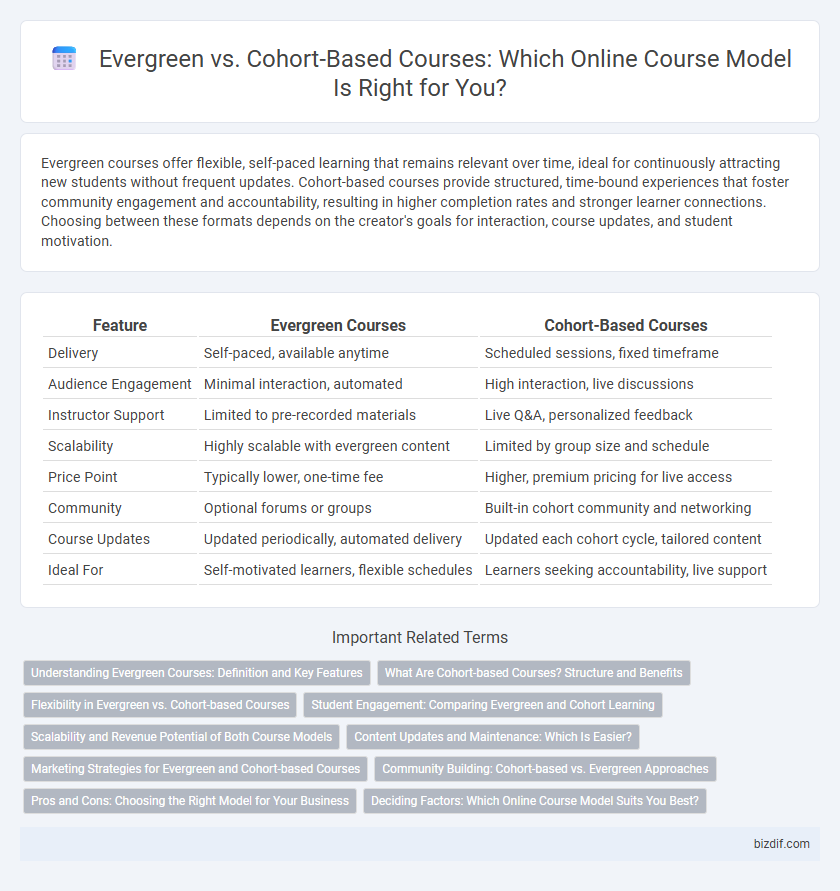Evergreen courses offer flexible, self-paced learning that remains relevant over time, ideal for continuously attracting new students without frequent updates. Cohort-based courses provide structured, time-bound experiences that foster community engagement and accountability, resulting in higher completion rates and stronger learner connections. Choosing between these formats depends on the creator's goals for interaction, course updates, and student motivation.
Table of Comparison
| Feature | Evergreen Courses | Cohort-Based Courses |
|---|---|---|
| Delivery | Self-paced, available anytime | Scheduled sessions, fixed timeframe |
| Audience Engagement | Minimal interaction, automated | High interaction, live discussions |
| Instructor Support | Limited to pre-recorded materials | Live Q&A, personalized feedback |
| Scalability | Highly scalable with evergreen content | Limited by group size and schedule |
| Price Point | Typically lower, one-time fee | Higher, premium pricing for live access |
| Community | Optional forums or groups | Built-in cohort community and networking |
| Course Updates | Updated periodically, automated delivery | Updated each cohort cycle, tailored content |
| Ideal For | Self-motivated learners, flexible schedules | Learners seeking accountability, live support |
Understanding Evergreen Courses: Definition and Key Features
Evergreen courses are online educational programs designed to provide timeless content that remains relevant regardless of when a student enrolls, ensuring continuous enrollment without scheduled start dates. These courses often feature pre-recorded video lessons, self-paced learning modules, and automated assessments, allowing learners to progress independently. Key features include scalability, consistent revenue generation, and the ability to update content periodically to maintain accuracy and engagement.
What Are Cohort-based Courses? Structure and Benefits
Cohort-based courses are structured learning experiences where groups of students progress through the material together on a fixed schedule, fostering collaboration and accountability. This format typically includes live sessions, interactive activities, and peer discussions to enhance engagement and knowledge retention. Benefits include stronger community building, real-time feedback, and increased motivation through shared goals and deadlines.
Flexibility in Evergreen vs. Cohort-based Courses
Evergreen courses offer unmatched flexibility by allowing learners to access content anytime, enabling self-paced progression that accommodates diverse schedules. Cohort-based courses follow structured timelines with set start and end dates, requiring participants to engage simultaneously for synchronous learning and collaboration. This rigidity can enhance interaction but limits flexibility compared to the always-accessible nature of evergreen formats.
Student Engagement: Comparing Evergreen and Cohort Learning
Evergreen courses offer flexible, self-paced learning that accommodates diverse schedules, enhancing accessibility but potentially reducing immediate peer interaction. Cohort-based courses foster structured, time-bound engagement, promoting collaboration, community building, and real-time feedback among students. This dynamic often leads to higher motivation and retention rates in cohort models compared to the autonomous nature of evergreen formats.
Scalability and Revenue Potential of Both Course Models
Evergreen courses offer significant scalability by enabling unlimited enrollments without additional instructor input, driving consistent passive income through automated content delivery. Cohort-based courses generate higher revenue potential per session due to personalized interaction and community engagement, though scalability is limited by fixed enrollment periods and increased facilitation demands. Combining evergreen content with periodic cohort sessions can optimize both scalable reach and premium revenue opportunities.
Content Updates and Maintenance: Which Is Easier?
Evergreen courses require less frequent content updates as they focus on timeless topics with stable fundamentals, making maintenance straightforward and scalable. Cohort-based courses demand regular content revisions to stay aligned with real-time learner feedback and market trends, resulting in higher ongoing maintenance efforts. Choosing between the two depends on your availability and willingness to invest in continuous course improvement.
Marketing Strategies for Evergreen and Cohort-based Courses
Evergreen courses benefit from automated marketing funnels, SEO-driven content, and email drip campaigns that continuously attract and nurture leads over time. Cohort-based courses excel with time-sensitive promotions, live webinars, and community engagement tactics that create urgency and foster peer interaction. Leveraging targeted social media ads and limited-time offers significantly boosts enrollment for cohort-based models, while consistent content updates and evergreen lead magnets enhance the discoverability and sustained sales of evergreen courses.
Community Building: Cohort-based vs. Evergreen Approaches
Cohort-based courses foster a strong sense of community by enabling real-time interaction, peer collaboration, and shared learning experiences within a defined timeframe. Evergreen courses often lack dynamic engagement due to self-paced structures, resulting in limited community building opportunities. Implementing discussion forums and periodic live sessions can enhance community aspects in evergreen models but typically do not match the immersive connectivity found in cohort-based approaches.
Pros and Cons: Choosing the Right Model for Your Business
Evergreen courses offer scalable, on-demand content that generates passive income with minimal ongoing effort, but may lack personalized interaction and timely updates. Cohort-based courses foster community engagement and accountability through live sessions and collaborative learning, enhancing student outcomes but requiring significant time investment and limited scalability. Selecting the optimal model depends on balancing business goals, audience preferences, and resource availability to maximize long-term profitability and learner satisfaction.
Deciding Factors: Which Online Course Model Suits You Best?
Evergreen courses offer flexible, self-paced learning ideal for knowledge-based content that remains relevant over time, maximizing passive income with minimal ongoing effort. Cohort-based courses foster community engagement and real-time interaction through scheduled sessions, enhancing accountability and learner motivation but requiring consistent facilitation. Choosing the right model depends on your content type, audience preferences, and your availability for live interaction versus automated delivery.
Evergreen Courses vs Cohort-based Courses Infographic

 bizdif.com
bizdif.com